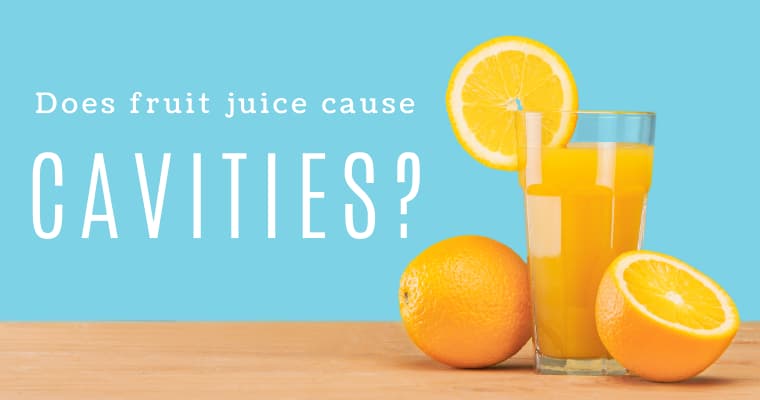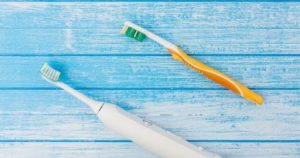Is Juice Bad for Children’s Teeth? (Truth & Tips Parents Need to Know)

“No Added Sugar”
“100% Real Juice”
“Organic Juice Drink”
It seems like these beverages would be the best choice for our children… right? Unfortunately, marketing gurus have found a way to create one of the biggest misconceptions for the average parent.
Our Registered Dental Hygienist, Emily, is a proud mom of two toddlers, and she wants to clarify the truth about juice and its impact on your child’s teeth.
So let’s dive into the question, “Is juice bad for children’s teeth?”
Is juice bad for children’s teeth?
Juices like apple and orange have the same sugar content as Coke or Pepsi. Grape juice has 50% more sugar than Coke or Pepsi.
Even a drink with the lowest content of sugar possible STILL contains sugar.
When this sugar binds to the bacteria found in our mouth, an acid is emitted that slowly breaks down tooth enamel. This break down of enamel can lead to dental cavities, tooth sensitivity, and discoloration. This is true of naturally occurring sugars AND added sugars.
These may be surprising facts to some people but the important thing to remember is, when it comes to teeth, the frequency of exposure is worse than the quantity consumed!
Why you should reduce the frequency your child drinks juice
One of the biggest misunderstandings we hear is with the amount of sugar found in a beverage. There are many drinks marketed as “low sugar” or “no added sugar.” This can be substantial for your overall health, however, when it comes to teeth, the amount of sugar in a beverage is not as important as the frequency your child consumes it.
With each sip of a sugary beverage, the pH (acidity level) in the oral cavity drops to a destructive acidic level for approximately 20 minutes.
Now, imagine if your child sipped on this beverage throughout the day: the pH in his/her mouth would never be able to recover to a healthy level, putting him/her at a much higher risk for dental cavities.
Many parents believe cutting juice or other sugary beverages with water will decrease the likelihood of cavities in the future. Unfortunately, this is not true.
A child who drinks a sugary beverage in one sitting is less likely to develop a cavity than a child who consumes watered-down juice and sips on it throughout the day.
This is simply due to the frequency of sugar exposure throughout the day.
How fiber plays a role in how your body processes sugar
Did you know when you juice a fruit, you leave behind the dietary fiber found in the skin and pulp?
According to the Opens new tab to American Dental Association website American Dental Association (ADA), this fiber plays an important role in how your body processes sugar as it passes through your gastrointestinal tract. When this fiber is left behind, the natural sugars found in fruit are more likely to negatively affect your blood sugar, which can lead to weakness, irritability, and headaches. On the contrary, these symptoms do not appear when eating fruits as a whole.
And even though some juices do contain many vitamins that are important for your growing child, the negatives heavily outweigh the positives. In fact, the Opens new tab to American Academy of Pediatrics website American Academy of Pediatrics suggests completely removing juice from the diet of children under 1-year-old.
Tips to protect your child’s teeth from juice if it is consumed once in a while
- Let juice and other sugary drinks be a treat! We’re not saying you have to be a parent who never lets their kid indulge. But all things in moderation! Sugary drinks should not be a daily part of your child’s diet.
- Drink juice in one sitting with a meal. When you’re eating a meal with any kind of carbohydrate, the pH in your mouth is already going to drop. This is a good time to go ahead and let your little one indulge. Remember: Frequency is more important than the amount! So if they’re going to have it, give it to them at a meal as opposed to in between meals.
- Avoid putting juice in sippy cups or bottles. Opens new tab to The American Academy of Pediatric Dentistry website The American Academy of Pediatric Dentistry states toddlers should not be given juice at bedtime or from sippy cups that can be easily carried around. This allows children to sip on juice easily throughout the day instead of consuming all at once.
- Drink through a straw. Using a straw decreases sugar exposure to the teeth.
- Rinse with water afterward. Have your child drink some water after drinking a sugary beverage to rinse off sugar. Fluoridated water is best if it is available.
- When in doubt, choose water. Water will never fail you – it is the best beverage of choice! The earlier you can get your child used to drinking water daily, the better.
More dental questions?
We were asked “Is juice bad for children’s teeth?” a number of times. What could we answer for you? Share your questions in the comments!


